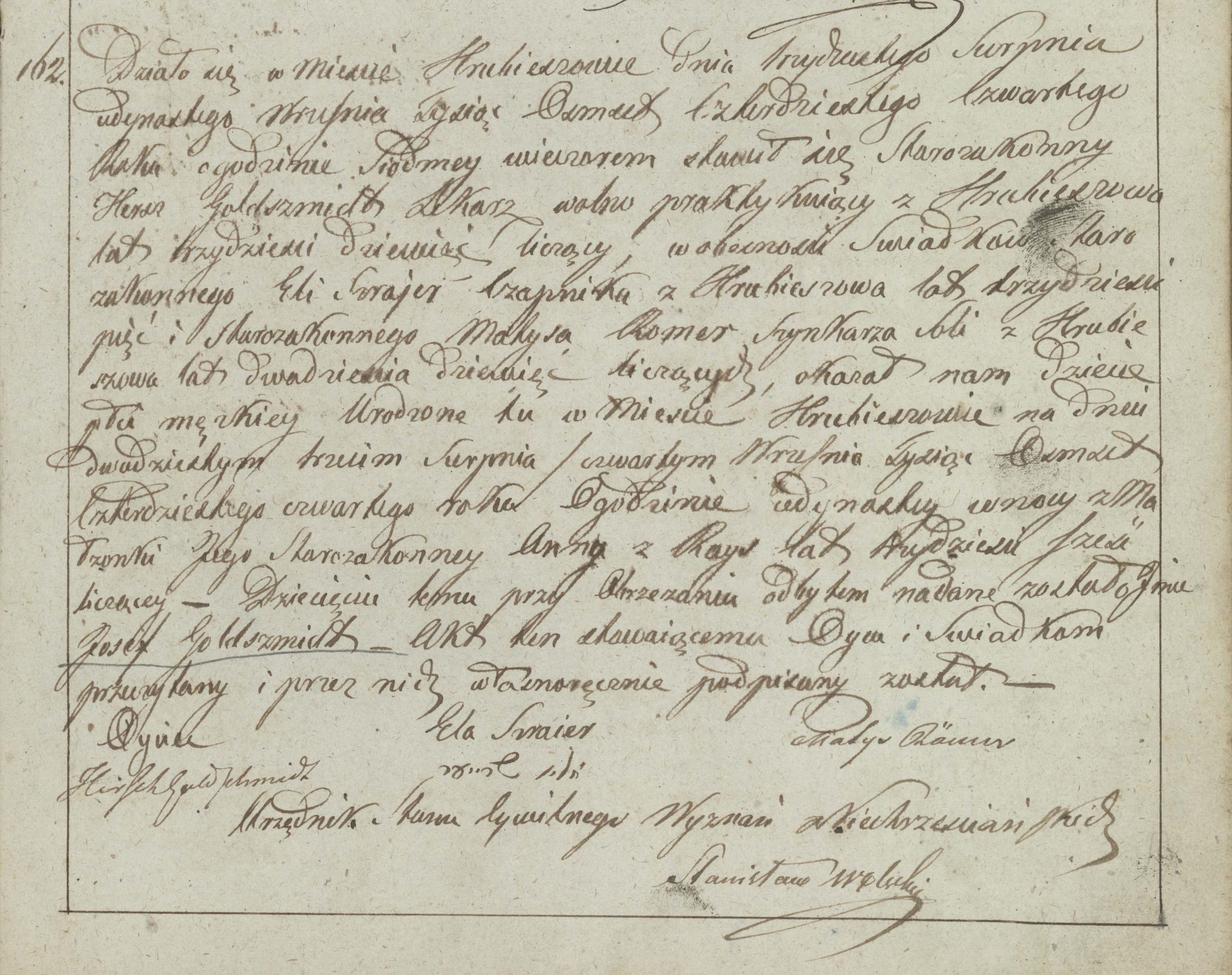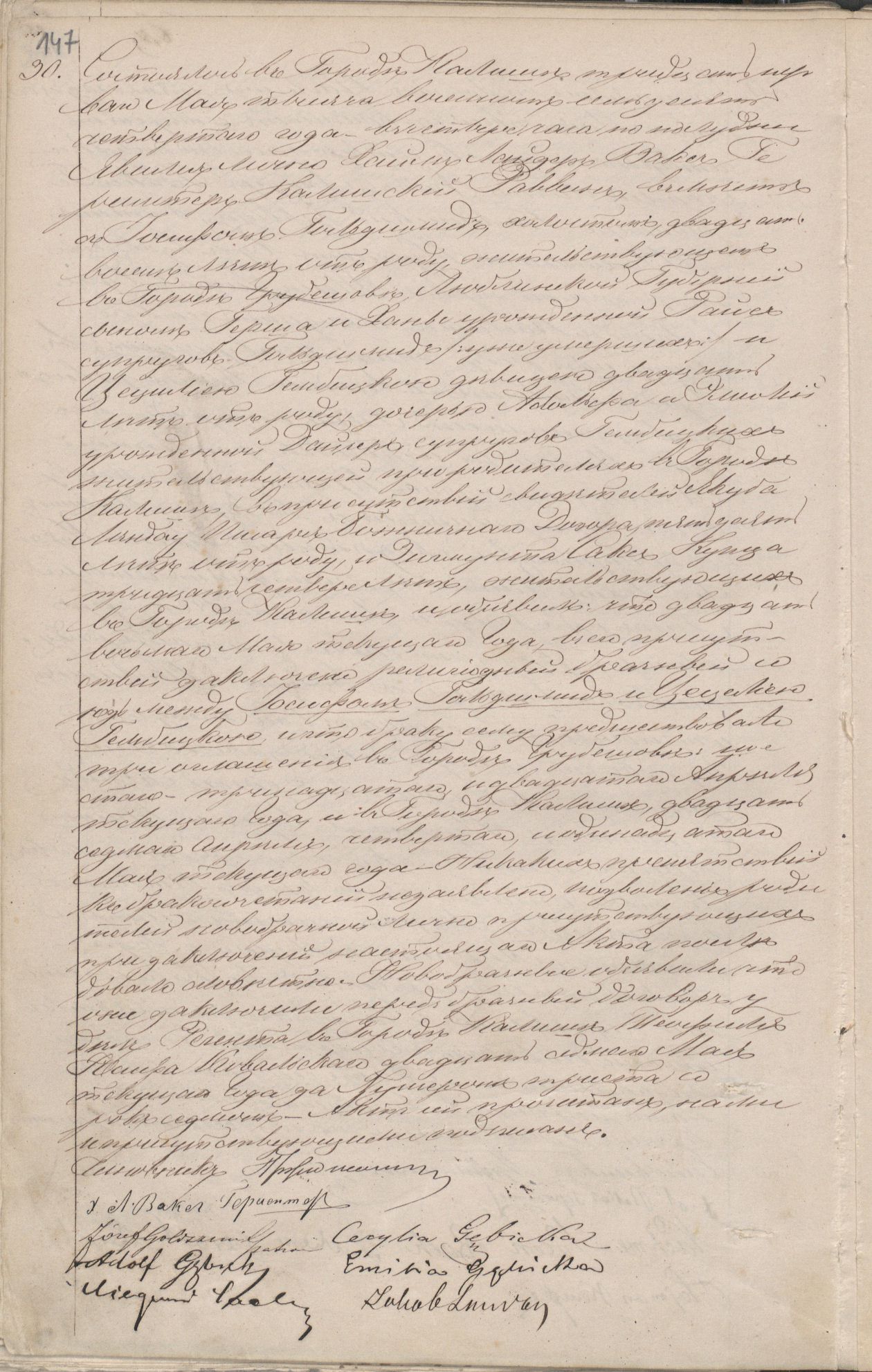Józef Goldszmit
Henryk Goldszmit’s father
A lawyer, the son of Hersz Goldszmit and Chana neé Rajs, born on 4 September 1844 in Hrubieszów; died on 26 April 1896.
The registration of the child in the local registry office for non-Christian religions on 11 September 1844 confirms that “at his circumcision, the child was named ‘Josef Goldszmidt.’” Other sources (including the marriage certificate, the register of students, and the tombstone) consistently include the Polonised version of the name – “Józef,” as well as 1846 as the year of birth. He probably attended elementary school in Hrubieszów.
In the years 1857–1863, he attended a secondary school in Lublin. At first it was gymnasium (a seven-grade secondary school), which, in accordance with the Act on Public Education in the Kingdom of Poland (the so-called Wielopolski school reform), in January 1862, was transformed into lyceum, an eight-grade secondary school. This is why the first press article written and published by Józef was signed “J. Goldszmidt, student of the 6th grade of the Lublin Lyceum” (Jutrzenka 1862, No. 48). One year later, due to the outbreak of the January Rising, the 7th grade was dismissed before the end of the school year, and the students did not take their school-leaving exams. Józef did not participate in the rising.
In the following years, he completed his education, and in the autumn of 1866, he started his university education at the Faculty of Law and Administration, Warsaw Main School (Szkoła Główna Warszawska, today’s University of Warsaw). He moved to 47 Krakowskie Przedmieście. During his studies, he published (mainly in Izraelita) letters and biographies of famous Jews as well as historical studies concerning the history of the Jewish nation. During that time, he also published three pamphlets as follow:
- in 1867 Wizerunki wsławionych Żydów XIX wieku. I. Sir Moses Montefiore (The Pictures of the Famous Jews of the Nineteenth Century. Vol. I. Sir Moses Montefiore), dedicated to his father;
- in 1868 Córka Handlarza. Obrazek z czasów ostatniej epidemii w Warszawie (The Merchant’s Daughter: The Picture from the Times of the Last Epidemics in Warsaw), dedicated to his mother;
- and at the end of 1868 but dated as of 1869, the second part of Wizerunki wsławionych Żydów XIX wieku, entitled Achilles Fould.
On 15 February 1870, at the newly opened Imperial University of Warsaw (Cesarski Uniwersytet Warszawski), which replaced Warsaw Main School, he defended his Master’s thesis, entitled Wykład prawa rozwodowego podług ustaw mojżeszowych talmudycznych (The Explanation of Divorce Law in the Jewish Laws of the Talmud). The thesis was published the following year. It was reviewed by Professor Władysław Holewiński, the head of the Chair of Civil and Commercial Law at both universities. The sources cited in the thesis as well as the works referred to in his earlier publications in Izraelita indicate that Józef could speak several languages – German, French, Russian, and Hebrew. He did not devote himself, however, to an academic or writing career. Instead, he chose to pursue a career as a lawyer.
In the years 1871–1874, he underwent a legal apprenticeship in Lublin, and then he moved to Kalisz. There, on 27 May 1874, he married Cecylia Gębicka, the daughter of Mina neé Daitszer and Józef Gębicki. The couple settled down in Warsaw, at 46 Podwale Street. Józef started to work as a lower-rank barrister, the so-called patron, in the civil tribunal. On 15 April 1875, the Goldszmits’ first daughter, Anna, was born. Henryk Elzenberg, Józef’s friend from the university was the witness of the child’s registration, which took place on 19 July. At that time, Józef owned some properties in Warsaw – in the birth certificate, he is described as “a barrister and a house owner.”
Beginning in 1877, he lived abroad. After his return, he saw his clients in a flat at 18 Bielańska Street, already as a sworn lawyer. When Adolf Gębicki, his father-in-law, died in 1877, Cecylia’s mother (Mina/Emilia) moved in with Józef and his wife. Henryk was probably born one year later. The father registered his son with a 3-year delay, in July 1882, after the family moved to 77 Krakowskie Przedmieście. There, on 12 February 1882, Józef and Cecylia’s third child was born; unfortunately, the baby-girl died at birth.
In the following years, Józef continued his career as a lawyer. He held his law office in a number of rented flats, situated in the city centre. The family lived at 15 Miodowa Street (1883–1885), 19 Miodowa Street (1886), and 3 Plac Krasińskich (1888–1890). Józef owned eight properties in the less presentable, western part of the city, on Hrubieszowska Street (the houses numbered 1, 2, 7, 9, 11, and 12), and on Karolkowa Street (the houses numbered 14 and 16). In the 1880s, he probably became engaged in the activities of the Society of Mutual Help for the Jewish Shop Assistants (Stowarzyszenie Wzajemnej Pomocy Subiektów Handlowych Wyznania Mojżeszowego); he was its honorary member and its lawyer. In the years 1891–1894, he and his family lived at 28 Świętojerska Street. His health problems started presumably at that time. In 1829, he underwent a course of treatment in Nałęczów. He was also hospitalized a number of times in mental asylums. His deteriorating health and the resulting financial problems forced the family to move to 18 Leszno Street in 1885, and then to 6 Nowosenatorska Street in 1896.
Józef Goldszmit died on 26 April 1896. He was buried at the Jewish Cemetery on Gęsia Street – currently Okopowa – on plot No. 71, alley No. 2.
Bibliografia
BIBLIOGRAFIA (w układzie chronologicznym)
Podmiotowa
- Lublin, d. 16 listopada 1862 roku. „Jutrzenka” 1862 nr 48 s. 405. [W rubryce] Korespondencja.
[podp.] J. Goldszmidt, uczeń klasy VI Liceum Lubelskiego.
O ratowaniu żydowskich pogorzelców przez chrześcijan, m.in. uczniów szkoły.
- Lublin, 10 czerwca 1863. Szanowny Panie Redaktorze! „Jutrzenka” 1863 nr 25 s. 244-245. [W rubryce] Korespondencja.
[podp.] J. Goldszmidt.
O potrzebie współistnienia oświaty i religii.
- Warszawa, w Maju 1866. „Izraelita” 1866 nr 8 s. 62. [W rubryce] Korespondencja. [podp.] J. G…….t
O modzie i sposobie krakowskiego rabina na zbędne wydatki izraelitek.
- Albert Cohn przez Józefa Goldschmidt. „Izraelita” 1866 nr 11-13, 15, s. 91-92, 99-101, 109-110, 124-126. [W rubryce] Życiorysy.
O pochodzącym z Węgier żydowskim orientaliście i działaczu oświatowym.
- Lublin, 6 września 1866. „Izraelita” 1866 nr 24 s. 206-207. [W rubryce] Korespondencja
[podp.] Józef Goldschmidt.
O ochronce dla dziewcząt izraelskich w Lublinie.
- Warszawa, 10 października. Szanowny Redaktorze! „Izraelita” 1866 nr 31 s. 263. [W rubryce] Korespondencja.
[podp.] Józef Goldschmidt.
O wizycie w synagodze na ul. Daniłowiczowskiej.
- Sprostowanie ustępu powieści T.T. Jeża pt. „Helena”. „Izraelita” 1867 nr 8 s. 67-69. [W rubryce] Artykuły.
[podp.] Józef Goldszmit.
- Towarzystwo artystów żydowskich w Amsterdamie. „Izraelita” 1867 nr 12 s. 104-105. [W rubryce] Artykuły.
[podp.] Józef Goldszmidt.
- Achilles Fould. „Kłosy” 1867 nr 127 s. 294.
[podp.] Józef Goldszmit
O francuskim mężu stanu z rodziny żydowskiej i jego pogrzebie w Paryżu.
- Ostatnie dni pobytu Żydów w Hiszpanii podług najnowszych źródeł opracował Józef Goldszmit. „Izraelita” 1869 nr 4-13 s. 29-30, 37-38, 50-52, 58-60, 66-68, 73-75, 81-83, 94-95, 101-103, 111-114. [W rubryce] Artykuły.
W spisie treści: Józef Goldszmidt.
- „Kupiec wenecki”. Dramat w 5 aktach przez Wiliama Szekspira. „Izraelita” 1869 nr 14 s. 122-124. [W rubryce] Artykuły.
[podp.] Józef Goldszmit; w spisie treści Józef Goldszmidt.
Uwagi o tytułowej postaci Shylocka w związku z wystawieniem dramatu w Warszawie.
Zob. też: T.C.: „Izraelita” o „Kupcu weneckim”. „Gazeta Polska” 1869 nr 82 (strona tytułowa).
- Żydzi lekarze we Włoszech podług niemieckich źródeł opracował Józef Goldszmit. „Izraelita” 1869 nr 28-31, s. 240-241, 249-251, 256-258, 263-264. [W rubryce] Artykuły.
W spisie treści: Józef Goldszmidt.
- O koniecznej potrzebie ochrony dla chłopców wyznania mojżeszowego w Warszawie. „Izraelita” 1869 nr 34 s. 285-286. [W rubryce] Artykuły.
[podp.] Józef Goldszmidt.
- Kobiety w Izraelu przez Józefa Goldszmidt. „Izraelita” 1869 nr 41 s. 342-345. [W rubryce] Artykuły.
Zapowiedziany dalszy ciąg nie ukazał się.
- [bez tytułu]. „Gazeta Polska” 1869 nr 4 s. 1. [W rubryce] Wiadomości literackie, artystyczne i naukowe.
[podp.] Józef Goldszmit.
Polemika z krytycznym omówieniem tomu II Wizerunków wsławionych Żydów XIX wieku w „Gazecie Polskiej” 1868 nr 288.
- Kupiec wenecki. „Kurier Lubelski” 1869 nr 29 s. 3.
[podp.] Józef Goldszmit.
Objaśnienie tła historycznego szekspirowskiego dramatu.
- Lublin 7 września (spóźnione); Warszawa 20 września. „Izraelita” 1892 nr 38 s. 323-324. [W rubryce] Korespondencja.
[podp.] Józef Goldszmit.
Dwie korespondencje o cholerze w Lublinie oraz Warszawie.
- [Odczyt wygłoszony 4 marca 1874 w Kaliszu]
Dochód z odczytu przeznaczony został na wpis dla niezamożnych uczniów.
Inf. za: „Izraelita” 1874 nr 14, s. 112-113.
Druki zwarte
- Wizerunki wsławionych Żydów XIX wieku. I. Sir Moses Montefiore przez Józefa Goldszmit Warszawa 1867 (z portretem), nakładem autora, str. 32.
Zawiera dedykację: „Najukochańszemu Ojcu, doktorowi medycyny, w dowód miłości synowskiej tę pierwszą pracę poświęca autor”.
Omówienia: [anonimowe] „Izraelita” 1867 nr 15, s. 16; nr 22, s. 72; nr 26, s. 108.
- Wizerunki wsławionych Żydów XIX wieku. Achilles Fould przez Józefa Goldszmit. Warszawa 1869 (z portretem), nakładem autora, str. 28.
Fragment przedr. w „Kalendarzu domowo-gospodarskim” na rok 1883.
Omówienia: [anonimowe] „Gazeta Polska” 1868 nr 288 str. tytułowa; polemika autora zob. poz. 15; S. Peltyn: Słów kilka o odłączności Żydów jako odpowiedź na recenzję życiorysu Achillesa Foulda w „Gazecie Polskiej” 1868 nr 288. „Izraelita” 1869 nr 1.
- Córka handlarza. Obrazek z czasów ostatniej epidemii w Warszawie skreślony przez Józefa Goldszmit. Warszawa 1868, str. 62. [Nadruk u góry] Biblioteczka gawęd i powiastek żydowskich.
Zawiera dedykację: „Cieniom najukochańszej i najlepszej Matki, Anny Goldszmit, zgasłej dn. 12 grudnia 1867 w dowód najgłębszej czci i przywiązania poświęca wdzięczny syn”, oraz wiersz Nad grobem Matki. (Cieniom Anny G. poświęcone) [podp.] Józef G., Warszawa, 12 lipca 1868, s. 2-4. Przedr. wiersza: „Warszawianin. Kalendarz familijny na rok 1882”, s. 92-93.
Omówienia: Jehuda H… [Notka w dziale Bibliografia]. „Izraelita” 1868 nr 28 s. 228 (zapowiedź druku powiastki oraz dalszego ciągu serii Wizerunki wsławionych Żydów XIX wieku).
- Wykład prawa rozwodowego podług ustaw mojżeszowo-talmudycznych z ogólnym poglądem na ich rozwój z uwzględnieniem przepisów obowiązujących napisał Józef Goldszmit, magister prawa i administracji. Warszawa 1871, str. 266.
Praca magisterska.
Omówienia: [anonimowe] „Izraelita” 1870 nr 24 s. 194-195; S. Peltyn: O prawie małżeńskim u Żydów. Rzecz z okoliczności dzieła: „Wykład prawa rozwodowego podług ustaw mojżeszowo-talmudycznych” Józefa Goldszmita, tamże nr 45, s. 361-363.
Opracowania ogólne
- Z żałobnej karty. [Nekrolog]. „Izraelita” 1896, nr 17, s. 150.
- [Nekrolog]. „Tygodnik Ilustrowany” 1896 nr 10, s. 353.
- [Inf.:] Zmarł w Warszawie Józef Goldszmit, adwokat przysięgły. „Gazeta Sądowa Warszawska” 1896 nr 18. s. ostatnia.
- [Nota biograficzna]. Podręczna Encyklopedia Powszechna (S. Olgebranda) Warszawa 1897, t. III.
- [Nota biograficzna]. Wielka Encyklopedia Powszechna z ilustracjami i mapami. Warszawa 1900.
- [Nota biograficzna]. The Jewish Encyclopedia. New Jork – London 1904, t. VII.
- [Nota biograficzna]. Jewrejskaja Enciklopiedija. Petersburg, t. VI.
- [Nota biograficzna]. Encyclopedia Judaica. Berlin 1931.
- [Nota biograficzna]. Słownik Biograficzny Adwokatów Polskich. Warszawa 1980, t. I.





